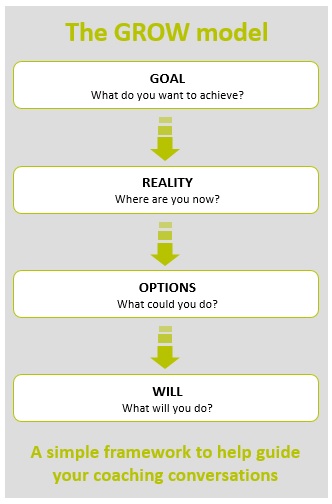
Strategy is the art of leading and co-ordinating actions to achieve a goal, so we can use this technique to support our clients by asking strategic questions. Coaching is not just a conversation, especially if you use strategic questioning within your coaching sessions to talk through these four different phases.
By using a simple framework like the GROW model, strategic questioning can help you as a professional coach analyze the current situation and understand the desired situation. This will support your client in their self-development and introspective review to help drive personal change.

Then by asking the right questions, you can explore a range of possible scenarios and opportunities, or blocks, drawbacks, obstacles and risks. This gets them to focus on action and outcomes that will eventually develop into a detailed step-by-step action plan. This allows them to have a representative map of the situation and helps them take a step back.
Throughout the process, your role is to provide unconditional support and positive feedback, so you bring out a range of possible solutions on which your client gives feedback. Then they commit to them through the development of an action plan. Coaching therefore accompanies a process of change in a system where strategic questioning will help your client get a clearer vision of the possible scenarios, the conditions for success and the actions needed.
Whatever your coaching style or specialism, you will fully succeed if you are able to create an atmosphere of trust and collaboration within your coaching sessions. This is normally based on the fundamental belief that your clients can find their own solution, with help from you through techniques like active questioning to identify and overcome the obstacles that hinder their progress and any success.
Your coaching style promotes the development of solutions to remove the brakes, use and capitalize on the resources available and facilitate a positive and creative mindset.
Working with a professional coach can be a valuable and rewarding experience, so selecting the right one is really important. To ensure you are at the top of that list, here are some of the most popular points companies and individuals consider before selecting a professional coach.
To help you practice strategic questioning and support you in your coaching sessions, we have published a range of virtual card games. They cover different subjects and can be used as a creative coaching tool with your clients:
Content is constantly being added to the site, so please check our on-line shop and look at the full range of games, ebooks and kits. Or read some of the other blog posts written by our team of international coaches.
Image: Thanks to Ann H for sharing their work on Pexels.
Please note – Our blog posts can only be shared if you include a reference and link to the original source: (cc) MyCoachingToolkit.com – 2023